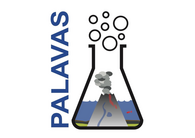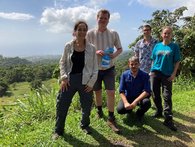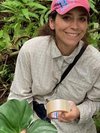Present and past weathering fluxes from tropical volcanic islands
The chemical weathering of silicate rocks is the largest atmospheric CO2 sink over geological time scales. The weathering of mafic rocks on volcanic islands probably plays a significant role in global CO2 removal by rock weathering, as these rocks have fast dissolution kinetics. Tropical volcanic islands are of particular importance because of their persistent rainfall, warm temperatures and high physical erosion rates (ER). Previous work, based on indirect evidence, suggests that the rate of weathering (VR) decreases sharply with time after deposition of fresh volcanic rocks.
Within this German-French bilateral project, we test this hypothesis that the VR of tropical volcanic islands is initially very high after the extrusion of a volcanic field, but then declines sharply until it reaches an "expiration date". After that, the high VR can no longer be maintained, as no landscape rejuvenation takes place through tectonic uplift. Thus, volcanic weathering and erosion could be closely linked: After extrusion of a volcanic cone, high ER cannot be maintained either.
We use elemental geochemistry and the novel beryllium (Be) and lithium (Li) isotope systems as tracers for weathering rates and intensity, complemented by biomarker analyses and numerical modeling, because the decrease in VR can be modified by prevailing precipitation and temperature conditions. Sampling with good temporal resolution is possible on the intensively studied tropical islands of Guadeloupe and Réunion: there we quantify VR and ER of recent weathering products (soils/river sediments), but on lava units of different ages and with different rock chemistry. Sedimentary archives in lakes (<10 ka) record the Holocene evolution of VR and ER. Marine sedimentary fans (<400 ka) off Réunion are directly fed by rivers draining lava units of different ages. These archives make it possible for the first time to analyze the entire weathering history of a volcanic field since the middle Pleistocene.
Project Partners
- Lukas Rowald, Freie Universität Berlin, Department of Earth Sciences, PhD Candidate
- Prof. Dr. Anne Bernhardt, Freie Universität Berlin, Department of Earth Sciences, Professor
- Dr. Julien Bouchez, Institut de physique du globe de Paris (IPGP)
- Dr. Fabien Arnaud, Université Savoie Mont Blanc, EDYTEM Laboratory of Environment
- Dr. Pierre Sabatier, Université Savoie Mont Blanc, EDYTEM Laboratory of Environment
- M. Tallon, Université Savoie Mont Blanc, EDYTEM Laboratory of Environment
Time Frame
- 01.09.2023 – 31.08.2026
Funding
- Deutsche Forschungsgemeinschaft (DFG), Projekt # WI 3874/9-1 und BE5070/13-1
- Französische Partner gefördert durch „ANR“





